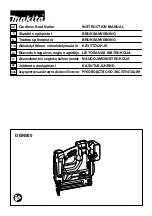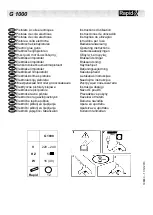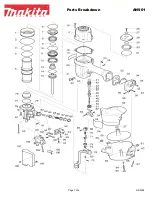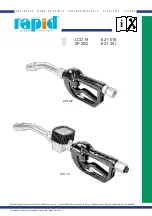
6
13.
Never use fastener driving tools marked with
the symbol "Do not use on scaffoldings,
ladders" for specific application for example:
−
when changing one driving location to another
involves the use of scaffoldings, stairs, ladders,
or ladder alike constructions, e.g. roof laths;
−
closing boxes or crates;
−
fitting transportation safety systems e.g. on
vehicles and wagons.
14.
Check walls, ceilings, floors, roofing and the
like carefully to avoid possible electrical shock,
gas leakage, explosions, etc. caused by
stapling into live wires, conduits or gas pipes.
15.
Use only fasteners specified in this manual.
The use of any other fasteners may cause
malfunction of the tool.
16.
Do not tamper with the tool or attempt to use
it for other than driving fasteners.
17.
Do not operate the tool without fasteners. It
shortens the service life of the tool.
18.
Stop driving operations immediately if you
notice something wrong or out of the ordinary
with the tool.
19.
Never drive fastener into any materials which
may allow the fastener to puncture and fly
through as a projectile.
20.
Never actuate the switch trigger and safety
lever at the same time until you are prepared
to fastener workpieces. Allow the workpiece
to depress the safety lever. Never defeat its
purpose by securing the safety lever back or
by depressing it by hand.
21.
Never tamper with the safety lever. Check the
safety lever frequently for proper operations.
22.
Always remove fasteners from the tool when
not in use.
SAVE THESE INSTRUCTIONS.
WARNING:
DO NOT let comfort or familiarity with product
(gained from repeated use) replace strict adherence
to safety rules for the subject product. MISUSE or
failure to follow the safety rules stated in this
instruction manual may cause serious personal
injury.
ENC007-9
IMPORTANT SAFETY
INSTRUCTIONS
FOR BATTERY CARTRIDGE
1.
Before using battery cartridge, read all
instructions and cautionary markings on (1)
battery charger, (2) battery, and (3) product
using battery.
2.
Do not disassemble battery cartridge.
3.
If operating time has become excessively
shorter, stop operating immediately. It may
result in a risk of overheating, possible burns
and even an explosion.
4.
If electrolyte gets into your eyes, rinse them
out with clear water and seek medical
attention right away. It may result in loss of
your eyesight.
5.
Do not short the battery cartridge:
(1)
Do not touch the terminals with any
conductive material.
(2)
Avoid storing battery cartridge in a
container with other metal objects such
as nails, coins, etc.
(3)
Do not expose battery cartridge to water
or rain.
A battery short can cause a large current flow,
overheating, possible burns and even a
breakdown.
6.
Do not store the tool and battery cartridge in
locations where the temperature may reach or
exceed 50
゚
C (122
゚
F).
7.
Do not incinerate the battery cartridge even if
it is severely damaged or is completely worn
out. The battery cartridge can explode in a fire.
8.
Be careful not to drop or strike battery.
9.
Do not use a damaged battery.
10.
Follow your local regulations relating to
disposal of battery.
SAVE THESE INSTRUCTIONS.
Tips for maintaining maximum battery life
1.
Charge the battery cartridge before
completely discharged.
Always stop tool operation and charge the
battery cartridge when you notice less tool
power.
2.
Never recharge a fully charged battery
cartridge.
Overcharging shortens the battery service life.
3.
Charge the battery cartridge with room
temperature at 10
゚
C - 40
゚
C (50
゚
F - 104
゚
F).
Let a hot battery cartridge cool down before
charging it.
4.
Charge the battery cartridge if you do not use
it for a long period (more than six months).







































